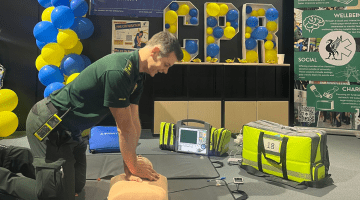About this course
Develop your theoretical knowledge of mental health and study alongside graduates from a range of related backgrounds in a dynamic and creative environment.
- Develop your knowledge of mental health
- Access a diverse and inclusive learning experience
- Work with fellow students on research projects that support change in and around the mental health milieu
The programme ethos is to create an environment where you will be exposed to a diverse and inclusive learning experience, enabling you to work collaboratively in developing research projects with the potential to support change in and around the mental health milieu.
The systemic agenda in the public and private sectors focus on crossing boundaries and enabling whole systems change. There are very few programmes nationally where the focus is on integration of learners from multiple sectors of practice and society in considering the sociocultural aspects of mental health illness. This Masters programme aims to facilitate a wide-ranging approach to change in mental health.
You'll benefit from high quality teaching in a modern and developing faculty. The combination of core, optional and research modules creates an environment in which you are supported to develop your thinking and knowledge of mental health through education and research. The programme team have a depth and breadth of subject specific academic knowledge designed to ensure you are supported in developing both personally and professionally.
LJMU graduates tell us that during their time here they learned from experts in their field, enjoyed great one-to-one support and were challenged. They made friends with people from all over the world, tried new sports and got free access to some of the finest cultural events in the UK. Although we love to hear that our graduates had an incredible time, we know that your experience is going to be unique and shaped entirely by you, your needs and your ambitions.
Please note: This programme is not a Nursing (Mental Health) pre-qualifying programme and will not result in you being registered as a nurse. Please instead see our BSc (Hons) Nursing Mental Health undergraduate degree. This programme leads to registration as a nurse with the Nursing and Midwifery Council (NMC).
If you're a Registered Nurse and want to explore Mental Health in the context of your practice, you may also be interested in our MA Nursing Mental Health postgraduate degree.
Course modules
Discover the building blocks of your programme
There are five compulsory Core modules, totalling 140 credits.
The remaining 40 credits are made up of your choice of Optional which can be tailored to your personal interest.
Further guidance on modules
Modules are designated core or optional in accordance with professional body requirements, as applicable, and LJMU’s Academic Framework Regulations. Whilst you are required to study core modules, optional modules provide you with an element of choice. Their availability may vary and will be subject to meeting minimum student numbers.
Where changes to modules are necessary these will be communicated as appropriate.
Core modules
Research Methodology, Methods and Data Analysis
30 credits
30 credits
This module aims to develop your research skills in the field of health and social care practice. It also enables you to systematically evaluate research outcomes from a variety of sources. The module:
- provides a critical knowledge base of the philosophical foundations of health and social research
- enables you to develop expertise in qualitative and quantitative data analysis
- enables you to carry out empirical and literature-based research
Dissertation
60 credits
60 credits
The dissertation module offers the student the opportunity to explore in-depth an area of personal or professional interest that relates to their programme of study. In doing this, facilitated support and guidance will be offered to enable the learner to expand their research knowledge, skills and personal effectiveness and apply what has been learned in previous modules to the development of their own research/quality improvement project.
The Self in Mental Health
20 credits
20 credits
This module aims to critically explore the concept of the self within a mental health context. It is assessed via a referenced script or your journey of development and oral presentation to support this. The focus is on the different aspects of the self; the responsible self relates to society and culture, the development of self relates to the psychological and emotional aspects of self, the potential self relates to coaching, and the reasoned self ethical reasoning and decision-making. You will explore the self as personality, as a belief system, as a relational dynamic and therapeutic model to personal and professional practice - Peplau, Watson, Barker, Berne, and Heron. There will also be a focus on self-awareness as self-discovery and the use of self in the talking therapies encompassing critical reflection, emotional intelligence, self resilience, skills in relation to mindfulness, compassion-based approaches, advocacy and applying a right based approach.
The Creation of Mental Illness
30 credits
30 credits
This 30 credit module aims to develop a critical understanding of the historical and socio-cultural framework and perceptions of mental health illness. It is assessed via a poster presentation supported by a written critical analysis. The focus of the module is on the portrayal of mental illness through a variety of mediums. This includes the exploration of society's relationship with mental illness across time, the portrayal of mental illness through art, film, and media and the philosophical development of psychiatry and mental illness.
Optional Modules
Collaborative and Professional Practice in Dementia Care
30 credits
30 credits
The module runs over a 15 week period.
This module will be facilitated through a blend of lectures, tutorials and collaborative workshops. The module provides students with an opportunity for interprofessional learning. The aim of this module is to develop a deeper understanding of dementia, to think creatively to identify innovations in care delivery and how these can be adapted and applied to the service planning and delivery within the students own organisation.
Violence
10 credits
10 credits
This module critically examines a range of key issues relating to violence and health from international, national and local perspectives. It demonstrates the need for an interdisciplinary public health approach when addressing the causes of violence, building prevention control strategies, and promoting safety. It enables you to understand and develop strategies to control violence.
Understanding Addictions
20 credits
20 credits
This module enhances your knowledge and understanding of addiction as a public health issue and also its risk factors. It assesses different models of addiction e.g. drug addiction, alcohol addiction, gambling etc as well as its associations and mediators/moderators.
Addictions: Policy and Interventions
20 credits
20 credits
This module enhances your knowledge and understanding of addictions policy objectives, enabling you to critically assess the effectiveness of the interventions. It enables you to:
- identify core addiction policies and strategies from a UK and international perspective and assess how these are developed and put into operation
- examine how personal and structural forces impact on addiction and assess if these are related to policy objectives
- evaluate policies and interventions designed to improve addiction outcomes
Engaging in Children and Young People’s Complex Mental Health
20 credits
20 credits
This module offers a multi-disciplinary perspective on children and young people's mental health, covering child development, prevention, early intervention, various disorders, communication, and resilience.
Arts in Mental Health and Wellbeing
20 credits
20 credits
This module fosters a critical understanding of contemporary practices and research related to arts in the context of mental health and wellbeing. It equips students to articulate compelling arguments for the added value of arts engagement in promoting, preventing, managing, and treating mental health conditions.
Suicide Prevention in Adults: a Psychosocial Approach
20 credits
20 credits
This module will help you to develop a critical understanding of psychosocial suicide prevention approaches. You will be able to critically appraise and reflect on the application of these approaches in practice.
Your Learning Experience
An insight into teaching on your course
Study hours
This course has a strong emphasis on self-guided study. A 20-credit module, for example, may involve 30 hours of timetabled study over a 15-week period, supported up by independent study focused on virtual learning resources and allocated tasks.
Teaching methods
The MA Mental Health programme aims to offer high quality teaching in a modern and developing faculty. The combination of core, optional and research modules creates an environment in which you are supported to develop your thinking and knowledge of mental health through education and research. Teaching will be supported by a wider sector of the mental health practice community e.g. NHS, Social care, voluntary and independent sector, education and the business sectors.
Applied learning
MA Mental Health offers a creative and innovative approach to learning. The academic team is keen to develop new methods of enhancing your knowledge in the area of mental health.
You will learn via lectures, simulated learning, field trips, workshops, seminars, role play, scenario-based learning and critical debate. LJMU's virtual learning environment further enhances the learning experience and the use of interactive online resources have received positive feedback from students across the School. All course materials are available online via the virtual learning environment.
How learning is monitored on your programme
To cater for the wide-ranging content of our courses and the varied learning preferences of our students, we offer a range of assessment methods on each programme.
Where you will study
What you can expect from your School
Situated in the City Campus, the School of Nursing and Allied Health works with a wide range of health and social care organisations to design, deliver and evaluate a dynamic suite of postgraduate programmes. In addition to specialist facilities, you will find high quality meeting and seminar rooms and lecture theatres, the Avril Robarts Library which is open 24/7 during semesters plus a large cafe, IT facilities and social spaces.
LJMU's excellent educational and professional training facilities include £1.6 million practice suites which show a patient's journey from the home environment through to rehabilitation. We use the latest clinical equipment for simulations and developing clinical skills in child, adult and mental health nursing, paramedic practice, social work and midwifery. We also have purpose-built, soundproof booths with video camera and playback facilities.
Course tutors

May Baker
- Programme Leader
Our MA Mental Health degree provides an exciting opportunity for you to broaden your mental health knowledge by developing critical thinking in areas such as: mental health policy and practice, mental health research, the history of mental health and self-reflexivity in mental health practice. You will also have the opportunity to undertake research in a mental health topic of your choice, whilst being guided by subject experts.
Our MA Mental Health degree provides an exciting opportunity for you to broaden your mental health knowledge by developing critical thinking in areas such as: mental health policy and practice, mental health research, the history of mental health and self-reflexivity in mental health practice. You will also have the opportunity to undertake research in a mental health topic of your choice, whilst being guided by subject experts.
May is an experienced senior lecturer in mental health and has been in higher education for the past 18 years. She is a mental health nurse with experience spanning 32 years, She has worked in and managed many facets of mental health care delivery. Whilst a strong mental health advocate and supporter of mental wellbeing, her main interest is addictions to include dual diagnosis and motivational interviewing. She strives to involve and encourage student ideas and experiences whilst actively encouraging them to participate in research which enhances the student/teacher relationship and supports their learning and progress.
Career paths
Further your career prospects
LJMU has an excellent employability record with 96% (HESA 2018) of our postgraduates in work or further study six months after graduation. Our applied learning techniques and strong industry connections ensure our students are fully prepared for the workplace on graduation and understand how to apply their knowledge in a real world context.
Postgraduate study is used by some to move up the career ladder, for others to change direction and for many simply to enhance their knowledge. As an academic venture, the Masters route offers the added value that research, learning and academic study can have on your personal and professional development.
Fees and funding
Tuition Fees:
- Home fee:
- £9,375
Fees
The fees quoted at the top of this page cover registration, tuition, supervision, assessment and examinations as well as:
- library membership with access to printed, multimedia and digital resources
- access to programme-appropriate software
- library and student IT support
- free on-campus wifi via eduroam
Additional costs
Although not all of the following are compulsory/relevant, you should keep in mind the costs of:
- accommodation and living expenditure
- books (should you wish to have your own copies)
- printing, photocopying and stationery
- PC/laptop (should you prefer to purchase your own for independent study and online learning activities)
- mobile phone/tablet (to access online services)
- field trips (travel and activity costs)
- placements (travel expenses and living costs)
- student visas (international students only)
- study abroad opportunities (travel costs, accommodation, visas and immunisations)
- academic conferences (travel costs)
- professional-body membership
- graduation (gown hire etc)
Funding
There are many ways to fund postgraduate study for home and international students. From loans to International Scholarships and subject-specific funding, you’ll find all of the information you need on our specialist postgraduate funding pages.
Please be aware that the UK’s departure from the EU may affect your tuition fees. Learn more about your fee status and which tuition fees are relevant to you.
- International fee:
- £17,750
International Scholarships and payment plans
Liverpool John Moores University is committed to supporting international students by providing a range of scholarships and flexible payment plans to help students manage their tuition fees.
Scholarships
LJMU provides a variety of scholarships to support international students. Scholarships are available to self-funded students who have accepted their offer and met all the conditions outlined in their offer letter. Students must also demonstrate that they can cover living costs, travel, and other expenses associated to studying at the university. Postgraduate scholarships include tuition fee reductions and are often offered in partnership with external funding organisations.
All self-funded international students are eligible for an automatic scholarship worth up to £4,000. For more details and to view our full list of scholarships, visit the international scholarship webpages.
Deposit
All students must pay a £5,000 deposit before they can receive their CAS letter.
For more information view our deposit page.
Tuition Fee Payment Plan
After paying their £5,000 deposit, students have the option to pay their fees in full or in three equal instalments minus any internal scholarships and discounts. There are two payment options available for international students. You can either pay your tuition fees in full before enrolment or opt for a payment plan. With the payment plan, you can pay your fees in three instalments after making your £5,000 deposit. The first instalment is due before enrolment.
All payments should be made through Flywire. Full details can be found in the How to Pay Guide.
Early Bird Tuition Fee discount
We are excited to introduce a £500 Early Payment Discount to all self-funded international students. Eligible self-funded students who pay their fees by the required deadlines will get a discount which will be automatically deducted from the 1st year of tuition fees.
To see the required deadlines please visit the webpage
Entry requirements
You will need:
Qualification requirements
Undergraduate degree
LJMU accepts a first- or second-class honours degree in an appropriate subject from a UK Higher Education Institution. We will consider applications from anyone that can demonstrate an interest in the programme and has some relevant experience.
Alternative qualifications considered
We also welcome applications from those with non-standard qualifications who can demonstrate equivalent professional qualifications, experience and knowledge developed in the workplace or other setting relevant to the mental health programme. If you do not hold the standard academic entry requirements, please use your personal statement to provide further details. Non-standard applications will be considered on a case-by-case basis.
International requirements
Other international requirements
Applicants that require a visa to study in the UK will require a recognised English Language proficiency test or international school qualification at IELTS grade at 7.0 in each component (or equivalent). A list of current accepted qualifications are available on the website.
How to apply
Securing your place at LJMU
To apply for this programme, you are required to complete an LJMU online application form. You will need to provide details of previous qualifications and a personal statement outlining why you wish to study this programme.
Your student experience
There's so much more to university than just studying for a degree.
Talk to our students
Connect with a current LJMU student through Unibuddy for insights and advice on university life, courses, and more.
See what our students are saying
At LJMU we want you to know you’re making the right choice by studying with us. You can see what our students are saying about their experience with us through their reviews on the following websites:
Related Links
News and views
Browse through the latest stories and updates from the University and beyond

.png)








The University reserves the right to withdraw or make alterations to a course and facilities if necessary; this may be because such changes are deemed to be beneficial to students, are minor in nature and unlikely to impact negatively upon students or become necessary due to circumstances beyond the control of the University. Where this does happen, the University operates a policy of consultation, advice and support to all enrolled students affected by the proposed change to their course or module.










